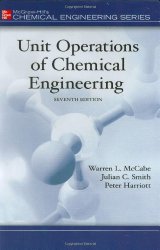Engineering Bookshelf
- Aerospace
- Biological
- Civil
- Chemical
- Environmental
- Electrical
- Materials
- Mechanical
- Petroleum
- Geoengineering
- Software

Unit Operations of Chemical Engineering
by Julian C. Smith, Peter Harriott, Peter Harriot, Warren L. McCabePublisher: McGraw-Hill Science/Engineering/Math
ISBN: 0072848235
Check price @ amazon.com , amazon.ca , amazon.co.uk
Book Description
Unit Operations of Chemical Engineering, continues its lengthy, successful tradition of being one of McGraw-Hill's oldest texts in the Chemical Engineering Series. Since 1956, this text has been the most comprehensive of the introductory, undergraduate, chemical engineering titles available. Separate chapters are devoted to each of the principle unit operations, grouped into four sections: fluid mechanics, heat transfer, mass transfer and equilibrium stages, and operations involving particulate solids.
Now in its seventh edition, the text still contains its balanced treatment of theory and engineering practice, with many practical, illustrative examples included. Almost 30% of the problems have been revised or are new, some of which cover modern topics such as food processing and biotechnology. Other unique topics of this text include diafiltration, adsorption and membrane operations.
Table of Contents
I Introduction
- Definitions and Principles
II Fluid Mechanics
- Fluid Statics and It's Applications
- Fluid Flow Phenomena
- Basic Equations of Fluid Flow
- Incompressible Flow in Pipes and Channels
- Flow of Compressible Fluids
- Flow Past Immersed Bodies
- Transportantion and Metering of Fluids
- Agitation and Mixing of Liquids
III Heat Transfer and It's Applications
- Heat Transfer by Conduction
- Principles of Heat Flow in Fluids
- Heat Transfer to Fluids Without Phase Change
- Heat Transfer to Fluids With Phase Change
- Radiation Heat Transfer
- Heat-Exchange Equipment
- Evaporation
IV Mass Transfer and It's Applications
- 17 Principles of Diffusion and Mass Transfer Between Phases Theory of Diffusion
- 18 Gas Absorption
- 19 Humidification Operations
- 20 Equilibrium-Stage Operations
- 21 Distillation
- 22 Introduction to Multicomponent Distillation
- 23 Leaching and Extraction
- 24 Drying of Solids
- 25 Fixed-Bed Seperations
- 26 Membrane Seperation Processes
- (and more...)
Customer Reviews
zia khan from india
it is the best books i have ever read in my semester ofchemical engineering. the topic i like the most, is transportation offluids .this book is recommended by my professor. the matter of turbulent flow and laminar flow is just fantastic.
mohamedah@yahoo.com from The United Arab Emirates
I work in the chemical operations sector. I will highly recommend this book for 3rd or 4rth year future chemical engineers. It contains viable information on many units that they will just have to know about. However, I will not recommend it for working operation engineers. It is too general for us, it doesn't problem shoot units such as pumps and compressors. I don't think that I have much use for this book, specially that I own the Perry's Handbook.
A reader from Ithaca, New York
Warning: This is not a textbook. Basically, they took out some of the stuff from Perry's and rewrote it more carefully and filled in some of the details. In general, this book is hard to read, missing important things, and burdened with unimportant things. It really does no justice to the quality and quantity of amazing insight inside the head of Peter Harriott (from whom I've taken classes). I can't deny that it makes an awesome reference book, but woe to any class that depends on this book.
A reader from Pasadena, CA
I went to cornell where Prof. Harriot teaches. This book is a must for reference. There are points where it is a little difficult but it is really a overall good book.
Jaya M Purswani from Cleveland, Ohio, USA
As a chemical engineering student, I borrowed my roommate's copy of the book so much that she thought it was my book and asked to borrow it back.
jamesf@netcom.ca from Canada
If you are a Chemical Engineer and couldn't afford the Perry's, this book is a must!!
A reader
This book is userfriendly. I bought this in 1982. Still, I use this book when I need any information about unit operations of chemical engineering (fluid flow, heat transfer, mass transfer). Sometimes, I use this book like dictionary. I mean that I carry this book where I go